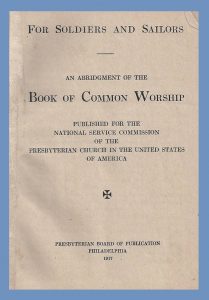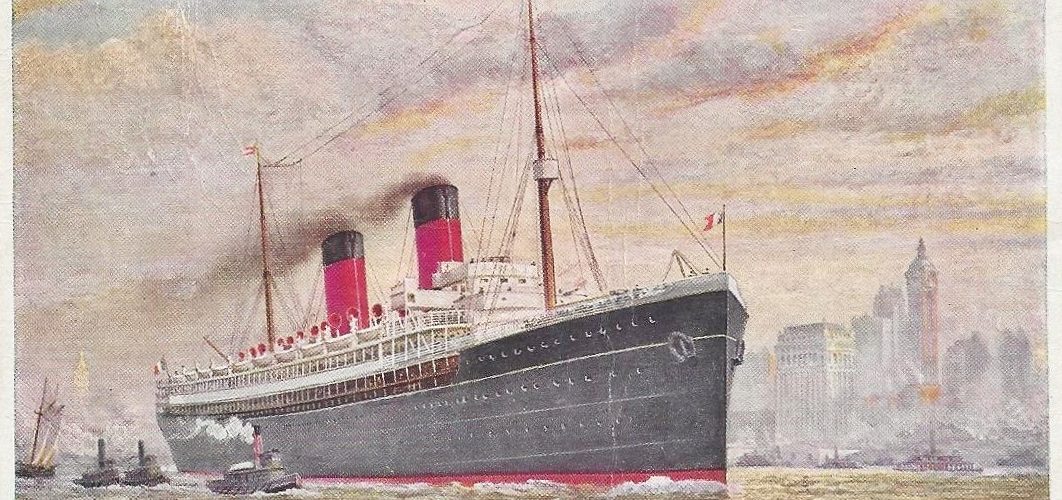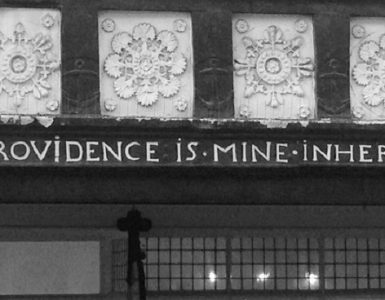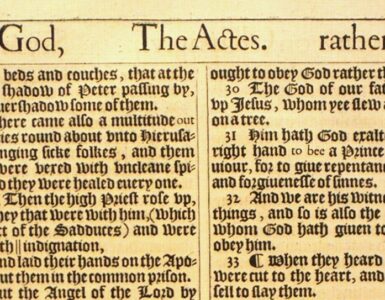After the United States declared war on April 6, 1917, the military and organizations associated with supporting the troops overseas were trained and prepared for relocation to the front. Included among the collection of organizations interested in supporting the troops were denominational chaplains and interdenominational workers. The General Assembly of the Presbyterian Church in the United States of America (PCUSA) during its sessions in May of 1917 took steps to include its ministers and other church workers in the massive mobilization for war.
According to the minutes for the 1917 General Assembly it was resolved that the Permanent Committee on Evangelism could “best promote religious work among soldiers and sailors through cooperation with the regularly appointed chaplains, and with the International Committee of the Young Men’s Christian Association (YMCA) whose work at the front, both at home and abroad, has been so signally blest” (p. 65). The interdenominational American Bible Society (ABS) requested a donation of 150,000.00 from the PCUSA, but the denomination instead recommended the work of the ABS to their churches as a way to provide every soldier and sailor with a Bible (p. 73).
The Special Committee on Sabbath Observance, among its other recommendations that were adopted, suggested that greater effort needed to be brought to bear on Sabbath liquor trafficking in the United States, and it rebuked the motion picture industry for its movie houses providing Sabbath entertainment. As the subject of the war was addressed by the Sabbath Committee, the report commented that munitions factories in the United States needed to break for a time on the Sabbath so workers could worship. The committee compared the war taking place in many areas of the world to Sabbath eroding activities in the United States which it believed were driven by greed.
These are times which try the souls of men. Preparedness and patriotism are words to conjure with. The war is upon us. The submarine is the terror of the sea, yet undaunted, our soldiers and sailors go forth to duty and if need be to die for their country and that democracy “might not perish from the earth.” Great inspiration, exalted principles! Let kings and potentates make way for liberty! But “lest we forget,” there are at our very doors institutions needing constant defense against the assaults of foemen worthy of their steel. The S.O.S. call during the past year has gone throughout the land—“Save Our Sabbath.” Never were battles more fiercely waged against the Lord’s Day, never were the forces of righteousness more severely put to the test of saving this priceless inheritance. The submarines of vicious, greedy money-makers have done their best to sink the ship of the Sabbath, and we purpose to point out in this Report some of the most serious phases of the situation (pp. 75-76).
It makes an inspiring bit of prose, but some more thought about this recommendation adopted by the General Assembly might have uncovered the poor parallel between observance of God’s Creation-Ordinance-Law Sabbath and the state wielding the sword to defend nations from aggressive foreign powers. Both the Sabbath and war are important, but on the one hand, the statement trivializes Sabbath observance as a practice that can be illustrated by the war activities of political powers, while on the other hand, it diminishes the high cost of war in terms of the many who die or are maimed in battle. The church wields its sword of the Word with an edge honed spiritually keen; the state wields its sword of power and protection to maintain peace and punish evil doers so the church can live in godliness and honesty.
The assembly authorized the moderator to appoint a National Service Commission of the PCUSA which was to include a minimum of twenty-five members to which were added the moderator and stated clerk as ex officio members. Moderator J. Wilbur Chapman of the Presbytery of New York greatly exceeded the 25 member minimum stipulated when he appointed 81 ministers and 80 laymen (list p. 448). The commission was instructed to “make formal offer to the Government of the United States of the services of the Presbyterian Church, and, upon any request that may be made by the Government, the Commission be authorized to call upon any or all of the agencies and resources of the Church as in its judgment may be wise or needful” (p. 156).
 One way the Presbyterian Church helped with the war effort was through the Presbyterian Board of Publication providing a worship-devotional book titled, A Book of Worship for Soldiers and Sailors, which is available in PDF for downloading by clicking Download Now!
One way the Presbyterian Church helped with the war effort was through the Presbyterian Board of Publication providing a worship-devotional book titled, A Book of Worship for Soldiers and Sailors, which is available in PDF for downloading by clicking Download Now!
The opening paragraph of the little book’s preface comments that the recent general assembly meeting had, “placed the entire resources of the Church at the disposal of the Government in carrying on the present war.” The book’s publishers had left out the key words at the end of the statement approved by the PCUSA General Assembly, “as in its judgment may be wise or needful” quoted in a previous paragraph of this article. The version published in the booklet presents the church as an unlimited servant of the state’s will. In Europe, churches serving their states, that is, state churches, have become state controlled churches. Thus, even though the intention of the booklet publishers was good, they should have left those last few words in the text. A bit more thought might have exposed the implications of their edited edition of the Assembly’s instruction.
A Book of Worship for Soldiers and Sailors, includes 96 pages between its khaki colored paper covers, measures 3 3/4 x 5 1/2 inches, and is about 1/4 inch thick. It could easily fit within a pocket or could be slipped into a small space in a pack. The author of this site apologizes for the first ten pages or so of the PDF not being well aligned, but all the text is present and the alignment improves.
BY BARRY WAUGH
Sources–The image of the postcard is the author’s. The particular ship is, La Lorraine of the Cie Gle line, and it may or may not have been involved in troop transport, but it is from the First World War era and it is a French ocean liner and other Cie Gle ships were used for U. S. troops transport.





